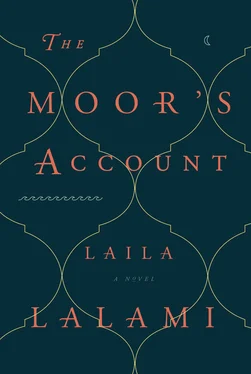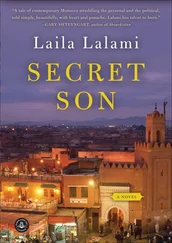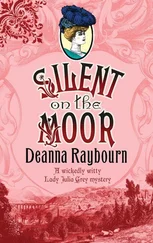He looked as though he expected me to congratulate him for this refusal. I opened my mouth to say something, but could think of nothing to say — nothing to say, at any rate, that would not sound argumentative or disrespectful or even amusing to him. If I said, But you promised me, he might reply that I was questioning his word and a quarrel would erupt. If I said, I have waited long enough for my papers, he might ask me what was the rush and what plans I was hiding from him. And if I said, You do not have a bill of sale any longer, he would have simply laughed and replied that it would take only one or two Castilian witnesses to produce a new bill of sale.
I reclined against the back of the sofa, sinking in the overstuffed damask cushions, the room around me fading into a blur of colors. This was not supposed to happen, I thought. Tenochtitlán was supposed to be a new beginning for me. Instead, and almost without my realizing it, Dorantes and I had slowly reprised our old relationship. Once again, he was standing in the sun and I had to retreat in his shadow. Once again, he was the speaker and I was the listener; he was the decider and I was the supplicant. Once again, he was the master and I was the slave.
An Aztec servant came in at that moment to announce that some gifts from Hernán Cortés had arrived. Bring them in, then, Dorantes said. The servant opened the door wide and in walked a pair of greyhounds. They were both male, brindle in color, eight to ten months old. Swiftly they walked around the room, tails wagging, sniffing at our hands and legs and at all the furniture. In disbelief, Dorantes stood up. What am I supposed to do with dogs? he asked. The servant did not reply, for a gift from Cortés could not be returned without causing some offense.
It was the first time I had seen greyhounds in New Spain. Their narrow faces reminded me of the sloughis of Barbary, which are used for hunting hare, but their color was similar to the dogs that the Capoques kept as companions. The two memories, one of Azemmur and one of the Land of the Indians, combined in such a way that they produced in me an even deeper melancholy.
The servant left now and Dorantes sat down again. He was expecting me to say something about his refusal of the money, and my insistent silence struck him as ungratefulness. Now he pressed me for some acknowledgment of his fortitude in facing down the viceroy. With his elbows on his knees, he asked: Who would refuse an offer from Mendoza?
No one.
No one in his right mind, he said. Now he stood up again and went to the glass doors. The dogs followed him there, but he ignored them. With his back still turned to me, he asked: Is there another slave in New Spain who can claim to have been invited to the tables of both the viceroy and the marquis?
No.
Or to have received Communion from the bishop himself?
No.
Or to stay at the viceroy’s guesthouse?
No.
Is there another master who allows his slave to go about as he pleases on the streets of the capital?
No.
So why do you want to run off like Cabeza de Vaca? Be patient, Estebanico. The two of us will have more adventures yet.
He returned to sit on the sofa. The dogs came to sniff his hands, but he shooed them away with irritation and turned to his side. A moment later, he was asleep.
THE CURTAINS WERE DRAWN when I walked into our room, cloaking it in a blue darkness. I made my way to the bed on the tips of my toes in order not to rouse my wife. The softness of Castilian bedsheets had eventually tempted her and she had begun to use the mattress. But she was not asleep; she sat up now, in her white nightdress and with her black hair loose on her shoulders. What did Dorantes say? she asked.
Nothing, I replied. In my shame, I could not bear to look at her. I sat down on the edge of the bed and slowly unbuckled my shoes. I felt a great heaviness all over my body; all I wanted to do was lie down and go to sleep and never wake up again.
He made up another excuse?
Slowly, I unbuttoned my doublet. Each gesture demanded great effort.
Why? she asked. Why do you keep believing him?
I lay down on the bed next to her and closed my eyes. The image that came to me was of the shard of clear glass, lying under a thicket of green cactus in the Land of Corn. I had been a free man then, roaming the world that God had made, providing solace to other people and receiving sustenance in return. But somehow I had started a chain of events that had led me to this city, this little room, this very bed. And not only had I lost my freedom once again, I had lost my wife’s, too. A horror. An unbearable horror.
Listen, Oyomasot said. She put her hand on my face and kept it there until I opened my eyes. Listen, my love. The more you ask him, the more he will want to hold on to you. What you want is not something that can be asked for, it can only be taken.
On the nightstand was a pitcher, another one of the gifts that had been sent to us by a nobleman after we had entertained him with our stories. Oyomasot poured me a glass of water, wiped the bottom with her palm, and handed it to me. Drink, she said, drink, you are burning up. I took a sip, turned to my side, and fell into a deep, dreamless sleep.
When I woke up, hours later, the first thought that occurred to me was that I had lost everything. I had lost the rustling of the Umm er-Rbi’ River, the view of the eleven minarets, the noise of the souq, the taste of figs eaten right off the tree, the pearls of dew that woke me when I slept on the rooftop of our house on hot summer nights. I had lost, too, the endless expanse of green wilderness, the taste of deer I had hunted, the sound of drums around the campfire at night. I had given up my right to go where I pleased, my right to work as I wished, my right to worship as I wanted. I had sacrificed my wife at the altar of my ambition. I had willingly walked back into darkness.
Everything was lost.
But a voice inside me said no — not everything.
I still had one thing. My story. I had journeyed through the Land of the Indians and had witnessed many things that my companions had preferred to revise, embellish, or silence. What had been changed, perverted, or left out was the heart of our history, the part that could not be explained, but could only be told. I could tell it. I could right what had been made wrong. And so I began to write my account. For every lie I had heard about the imperial expedition that had brought me to the edge of the world, I would tell the truth.
23. THE STORY OF THE GUESTHOUSE
On a cold evening in winter, I walked into the ferran around the corner from the grand mosque. The neighborhood’s bread trays were stacked in four neat columns along the far wall, each tray bearing a mark that identified its owner in some way: a small design carved on the handle or a colorful fabric for the bread. Orange flames rose inside the gaping oven and, even though I stood by the door to the street, I felt their heat. As I said my salaams, I noticed that the apprentice, a young boy of perhaps twelve or thirteen years of age, was new. Is Mohand not here today? I asked him. But the boy did not answer. He put a fresh loaf of bread on his peel and slid it deep inside the oven, placing it in a row next to the other loaves. Again I asked him about the baker. Where is Mohand? The apprentice turned toward me and, as he did so, his hand brushed against the edge of the oven door. His wails of pain were loud — so loud that they woke me.
For a moment, I was unsure if the cry I heard was an echo from the dream I was having. No, the sound came from inside the house. Beside me, Oyomasot had not stirred. Another moan of pain tore through the silence. I pushed back the covers and rushed to the door. The hallway still smelled of the roast chicken that had been served for dinner, in celebration of the Christian feast of the Nativity. At the other end of the house, the dogs were scratching at the kitchen door, begging to be let in; I had forgotten to tether them for the night. Then Dorantes’s door opened and he stepped out in his nightclothes. He stood, silhouetted against the candlelight from the bedroom, looking like a man who had gotten lost on his way home. When he saw me in the hallway, the confusion on his face gave way to relief. Tekotsen, he whispered. Tekotsen is in labor.
Читать дальше












